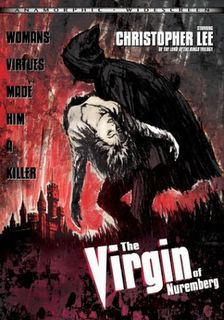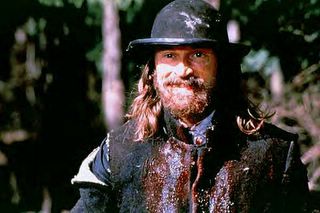The Bloodening!
Every Halloween, I try to come up with a cool list of horror films. I watch intensely gory or scary movies all year, just because I'm sick like that, so during this one night a year that the normals set aside to sample such forbidden pleasures, I get a rare opportunity to apply my knowledge.
These are, in my view, horror films that don't enjoy an appropriate level of noteriety. It's not that I don't think The Exorcist, The Texas Chainsaw Massacre, Nightmare on Elm Street, Child's Play and The Shining are great films. (Well, Child's Play is actually kind of lame.) But everyone, movie fans or not, knows about them and rents them on Halloween. Let's see if we can't find something new...
Village of the Damned (1960)
That woeful John Carpenter remake kind of robbed the movie of its sterling reputation. But Wolf Rilla's chilling sci-fi/horror classic is still creepy to this day. It's something about the flat, emotionless child performances. We're so used to seeing kid actors trained to be full of energy and, let's face it, obnoxious that really restrained, subtle performances from the very young are always deeply unsettling. (See The Sixth Sense, The Bad Seed and The Omen for other examples.)
The central conceit has become something of a pop culture joke. On one strange day, all the residents of a small English village fall into a deep sleep. When they awake, many of the town's women find themselves impregnated. 9 months later, they give birth to eerie, ultra-intelligent children who seem to possess a kind of hive mind.
Stir of Echoes (1999)
Box office juggernaut The Sixth Sense overshadowed David Koepp's adaptation of a Richard Matheson ghost story back in '99. Looking back years later, though, I still admire the intelligence and creativity behind Shyamalan's film, but I find Stir of Echoes more rewatchable. What lingers about the film is the intense, unstudied naturalism of Koepp's writing. The uncertain blue-collar family at its center feels so real that the intrusion of ghostly apparitions and madness into their lives becomes more personal and threatening. This is not some paranormal fantasy world where anything is possible, but a recognizable modern American town.
The Black Pit of Dr. M (1959)
I know it's a Spanish-language black and white horror film from the '50s, but please don't let that stop you from checking this one out. (The original title: Misterios de Ultratumba!) I swear, this is one of the most diabolically clever and atmospheric horror movies ever made. Fernando Mendez's clever spin on the Faust legend contains just about every permutation of classic horror cinema - reanimated corpses, midnight deadlines, seances, ghosts, carriage rides through fog-covered swamps, an isolated spooky manor and a brutal slaying. A death bed promise leads Dr. Masali (Rafael Bertrand) to exchange his immortal soul for knowledge about the afterlife in a film that's ceaselessly inventive and immensely entertaining.
The Virgin of Nuremberg (1963)
I'm not sure this actually qualifies as a true giallo. It's a mystery, but the setting is Germany, not Italy. Plus it's a bit early. I've always thought of giallo as a late '60s and '70s phenomenon. But director Antonion Marghariti certainly infuses his film with the same grotesque, expressive style as the famous masters of Italian horror, filling the frame with vibrant red blood against deep black backgrounds, sweeping his camera past baroque dining halls and into ghastly torture chambers.
A disfigured Holocaust survivor haunts a German castle, bringing women into the basement's torture museum and visiting on them all manner of horrors. (In the film's most famous sequence, a woman's face is gnawed off by a rat). An obvious metaphor for the complicity of all those Italians and Germans who looked the other way at the atrocities of the Nazis, The Virgin of Nuremberg has a lot to say amidst all the revealing bodices and carefully-shot bloodletting. Plus it features Christopher Lee in a small supporting role as a creepy butler!
Marebito (2004)
Like most movie fans, I'm a little sick of J-horror at this point. I can only watch so many movies about eerie, uncanny, wet little children with hair in their faces before it's just not that shocking any more. (Okay, Ju-On adds the fact that the kids make cat noises, but it's still wearing a bit thin).
Takashi Shimizu's Marebito, the story of a fear-obsessed cameraman who journeys to an underworld beneath the streets of Tokyo, plays with a lot of the same elements as other J-horror films but inverts them in new, more provocative and ambiguous ways. It may be the first film I have ever seen that's equally inspired by the writings of Jules Verne and H.P. Lovecraft.
The Last Man on Earth (1964)
The second film on this list inspired by the work of Richard Matheson, The Last Man on Earth is an Italian take on the short story "I am Legend." This story also was the basis for The Omega Man, that Charlton Heston camp classic of the '70s. But this version is much better, with Vincent Price as Dr. Robert Morgan, trapped in his suburban home after a worldwide plague turns the rest of the population into flesh-hungry zombies. Price is at his scenery-chewing best here, but what makes Last Man on Earth really memorable are the zombies, who unlike most of the walking undead, speak in dulcet, clear baritones.
Ravenous (1999)
Antonia Bird's brilliant cannibal western works simply as a terrific snowbound gorefest. A group of disaffected soldiers, mainly veterans of the Mexican-American war, are set upon by a ferocious man-eating cavedweller (Robert Carlyle). But it's also a large-scale metaphor for Manifest Destiny and the conquest of America by European whites.
Cannibalism in Bird's film has a supernatural element - the old Indian stories about devouring one's enemies and absorbing their strength is taken quite literally and at face value. Carlyle's fiend becomes exceptionally hard to kill, and only others willing to ingest human flesh themselves will have a chance to destroy him. Interesting little observations and dialectics like this run just under the surface of every scene in Ravenous, making it surprisingly dense for a film that's superficially about a bunch of soldiers eating one another. (The key to the entire film is the opening scene, in which Guy Pearce's disgruntled vet eats and then vomits up a rare steak in a tent with other military officers.)
Ravenous was a flop upon its initial release (in 1999, the last truly great year for movies), probably because it's difficult and idiosyncratic and, yes, violent. But it's time this stunning achievement had a serious critical and popular reappraisal.
Captain Kronos, Vampire Hunter (1974)
Brian Clemens, one of the creators of the original "Avengers" TV show, wrote and directed this swashbuckling vampire adventure that's arguably the most fun film ever produced by Britain's legendary Hammer studios. Goofy-looking German actor Horst Janson and his hunchbacked assistant Dr. Hieronymous Grost (John Cater) and the busty Caroline Munro scour the countryside looking for vampires, who suck out their victim's youth and beauty along with their blood.
Working from a template that has been used and reused thousands of times, Clemens brings his considerable wit to the exercize, making Captain Kronos a near-perfect blend of swordfighting action, gory horror and dry comedy.
Wisconsin Death Trip (1999)
Half-documentary and art film, James Marsh's Wisconsin Death Trip focuses on the true and grisly events that took place in Black River Falls, Wisconsin from 1890 to 1900. Using actual newspaper clippings from the time (read in the voice-over by Ian Holm), recreations and photographs from the period, Marsh paints an occasionally funny and always fascinating portrait of a town poised on the edge of madness.
Something must have happened in Black River Falls to create such bizarre behavior, everything from elaborate suicides to young children going on murder sprees. Individual cases seem to have some kind of rational explanation (for example, a woman who habitually smashes shop windows was has an addiction to cocaine), but other stories seem to reflect a general malaise or uncertainty. The modern clashes with the Victorian, the immigrant clashes with the native, but can any of these conflicts alone explain the sudden uptick in remarkable and horrifying police reports?
The Brood (1979)
Interestingly, David Cronenberg's big crossover titles tend towards dramas and psychological thrillers - like A History of Violence, The Dead Zone or Crash - when most of his work more closely resembles The Brood. This is dark, violent, wrenching horror in which the source of the fear comes from within the protagonist, and thus can't be "faced down" or conquered. Nola Carveth (Samatha Eggar) is under the care of a mysterious psychiatrist (Oliver Reed) for a strange disorder that has in some indirect way led to brutal attacks. Her husband (Art Hindle) is suspicious about the doctor's methods and does some investigating, uncovering a truly far-fetched and seriously messed-up diagnosis with a lot of intriguing ramifications. I'll grant that this is not among Cronenberg's all-time best, but more people are familiar with Scanners and Videodrome and some of the others, so I thought I'd highlight this less-known early entry. (Also, Rabid and Shivers are both essential viewing for horror fans.)

5 comments:
OMG...i just saw the remake of The Omen...It might be the worst movie i have ever seen
I didn't really think it was all that bad. Just very much the same as the old one with a few lame "scare" sequences added in. And with some not-very-good performances. But otherwise, if you hadn't seen the original, you might think this new one was kind of good...
I actually havnt seen the original and i still think this is a really bad movie. Julia stiles is god awful
Yeah, the whole cast's pretty much a step down from the original. (David Thewlis used to be a really cool actor, but these days he works exclusively in shit movies.)
Although I have to say, if you didn't like this one, you probably wouldn't like the '70s version either. It's a bit classier, without all the silly dream sequences, but still fairly similar.
I found this article to be the most helpful. I had no difficulty understanding the writing and the content. Thank you for your post. In this profile, we show you how to determine the scroll speed of your mouse. Please let me know what you think. Speed Roller Checker
Post a Comment